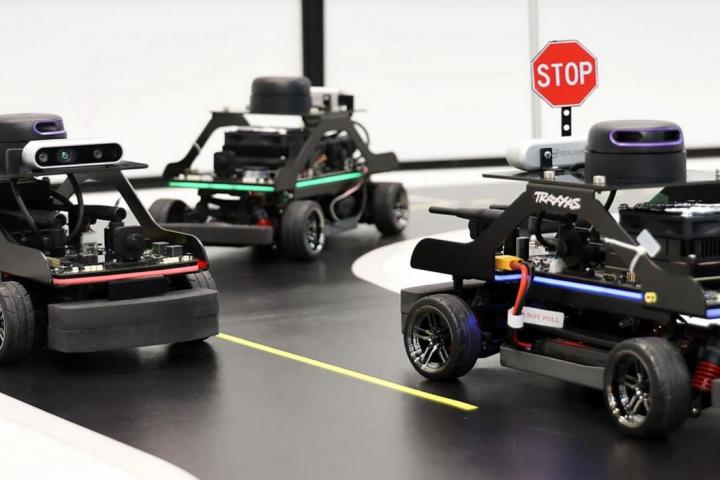
Team 2 Fast 2 Driverless, composed of students from the Cybernetics and Robotics programme at the Faculty of Electrical Engineering at the Czech Technical University in Prague, advanced to the top eight out of more than sixty universities, narrowly beating out a team from York University in Toronto, Canada, in the finals. The third place went to the team from the National Polytechnic University of Armenia. Of the 12 teams selected to compete in the final round, only 8 participated due to visa problems. Among those who did not make it to Denver was China's Tsinghua University. The favoured team from the US Massachusetts Institute of Technology (MIT) surprisingly did not make it past the first semi-final heat.
The team of FEE CTU did well in both the qualification and semi-final stages of the competition, in which they took first place. In the finals, where the best three teams advanced, the students from Prague were deprived of the victory in the finals by a single mistake - a knocked down mark meant repeating the run and losing valuable time. The difference between first and second place was only 4 percent of the score. "Of course, we wanted to defend our victory and there was really little missing. In the end, one small mistake decided the race - because of it we did not manage to finish one of the planned runs," says team leader doc. "Even so, our students deserve the utmost respect - they did a great job both during the three months of preparation and during the final in Denver. The whole system was technically well prepared."
The brief for this year's competition was significantly more challenging than last year's: the teams had to design and deploy a system for autonomous taxis. The 1:10 scale vehicles had to autonomously navigate a model city in a limited amount of time, plan routes between pick-up and drop-off points, recognize traffic signs and traffic lights, and react to obstacles - including moving objects.
The autonomous vehicle system ran on a powerful NVIDIA Jetson AGX Orin computer and used advanced machine learning algorithms to detect traffic features and plan the trajectory. Key benefits were sensor data fusion, robust control of vehicle dynamics, and a high degree of autonomy without the need for an external computing server. In preparation, the students had to implement features such as fusion of individual car sensor data, design of car dynamics control and path guidance, trajectory planning, and image processing systems for obstacle, traffic light and traffic sign detection.
The competition took place on a standardised model of the city, which the students physically transferred to the FEL classroom at Charles Square on a one-to-one scale. At the same time, they also used a digital twin, with which they could debug the algorithms to perfection in a safe virtual environment before deploying them on the real model. The team consisted of Kateřina Hobzová, Jakub Macar, Otakar Kodytek, Jan Kohout, Martin Jeřábek, Ondřej Kuban and PhD student Jan Švancar (captain).
Last year's victory in the competition brought FEE CTU not only prestige, but also access to teaching materials and simulators. Thanks to this, other student projects have also developed. This year, although the team has changed half of its members, the experience was passed on by "veterans" - Jan Švancar and three of last year's finalists.
The academics from FEL CTU want to build on their success in the competition at home. "Next year we plan to organize an international summer school in Prague focused on autonomous systems, where students from all over the world will gain experience in designing control algorithms, simulations and practical testing on physical models of vehicles," says Assoc. Tomáš Haniš. Preparations have so far been hampered by the limited availability of a suitable hardware platform, but the team is working on its own solution that will enable quality teaching even outside the competition environment.
About the 2025 ACC Self-Driving Car Student Competition
The ACC Self-Driving Car Student Competition is a prestigious international competition held as part of the American Control Conference (ACC). This year, it was held in Denver, Colorado, USA, from July 7-9, 2025. Student teams were tasked with designing, building and demonstrating the capabilities of an autonomous vehicle - this year in the role of an autonomously driven taxi. The vehicle must serve as many customers as possible within a limited amount of time. Teams plan routes between pick-up and drop-off points, react to traffic situations, obey traffic rules, and earn a rating and "profit" based on their driving. The goal is to earn as much virtual money as possible in a few rides.
Photos from the CTU FEL team's preparation and the Denver competition are available via the link
https://drive.google.com/drive/folders/1yA7OMAXtH7JkCRwXSfDM0A3GzWusUgGj?usp=sharing
The participation of the FEE CTU team was supported by Valeo.